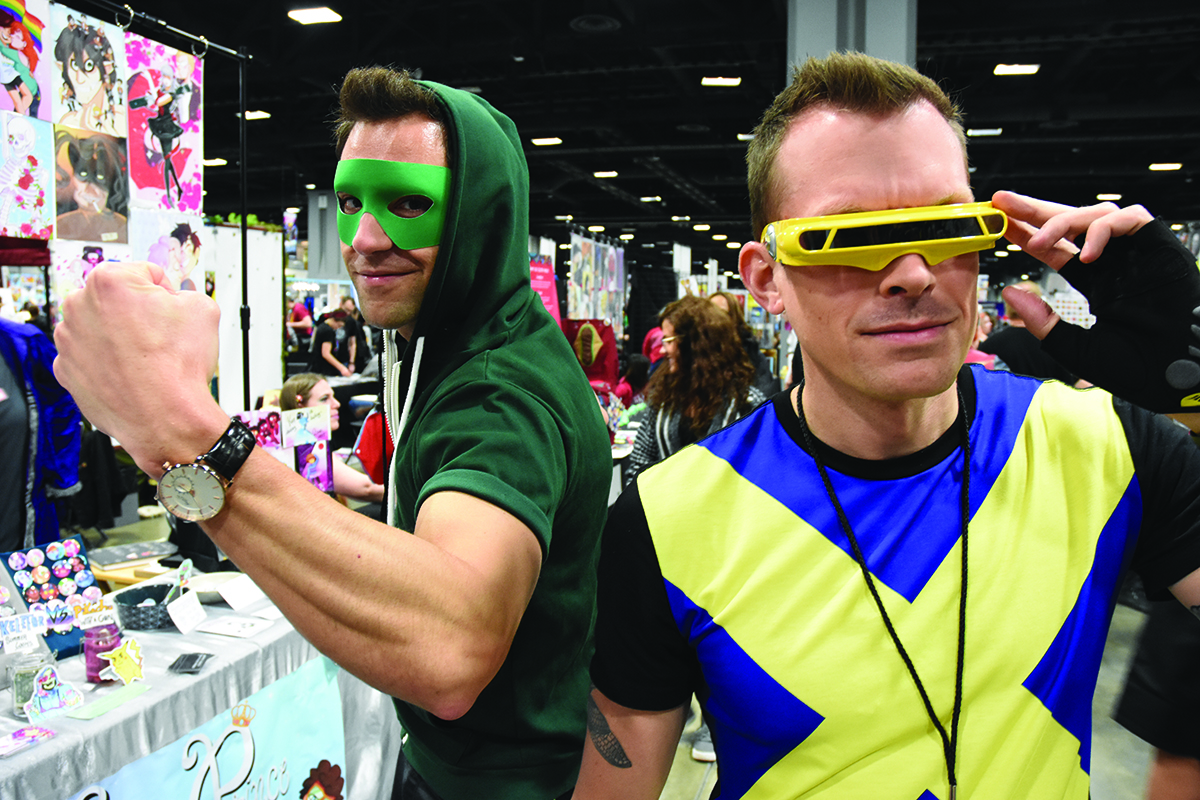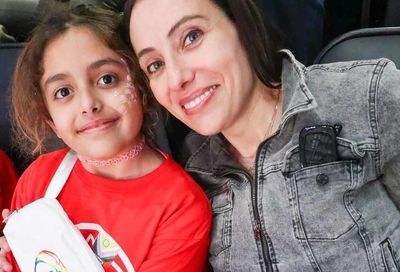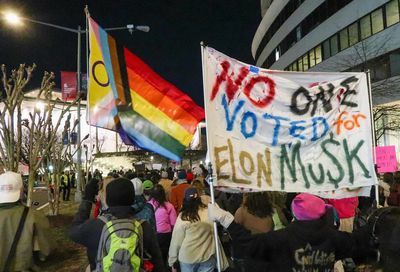Olivia Hill Made History in Tennessee. Now It’s Time for the Hard Work.
The newly elected Nashville councilmember is ready to get down to governing in one of the nation’s fastest-growing metro areas.

“When I announced that I was running for public office, I called a lot of other politicians in the Middle Tennessee area, and heard the same thing from everybody,” recalls Olivia Hill, the recently sworn-in Metropolitan Nashville Council Member At-Large, who became the Volunteer State’s first out transgender officeholder.
“All those politicians told me, ‘Olivia, on a campaign, you’re going to meet some really, really nice people. And two, you have no idea how big Davidson County is until you start campaigning the entire county,’ which is 526 square miles,” Hill says. “I’m sitting here in my car that I foolishly bought brand-new in February, and I’ve already got a little over 16,000 miles on it — and it hasn’t left the Nashville area. Those are all campaign miles.”
Hill was ultimately elected to one of the Council’s five at-large seats last month, placing fourth in the runoff election and making history in the process. The LGBTQ+ Victory Fund hailed her victory as a milestone for the transgender community, which has been targeted by a slew of bills championed by the state’s Republican-led legislature and signed into law by Gov. Bill Lee in recent years.
A U.S. Naval veteran who previously worked for the Vanderbilt University Power Plant for 26 years, the 57-year-old Hill is now retired, meaning she can focus her efforts on her job, which is technically considered a “part-time” position, despite requiring 40 to 50 hours of work per week.
“I didn’t run because I needed the money. I ran because I wanted to fix the broken parts of Nashville,” she says.
It was work experience that Hill leaned on heavily while campaigning, using her familiarity with utilities to speak to the stress placed on Nashville’s aging infrastructure by an influx of new residents whose consumption habits could potentially overwhelm the city’s outdated sewage systems and electrical grid. She also emphasized the importance of delivering on city services.
After undergoing a gender transition while still employed by Vanderbilt, Hill encountered workplace discrimination and harassment from co-workers and supervisors, prompting her to sue the university in September 2021 after it failed to address her concerns. Three months later, she and the university reached a settlement, and Hill retired soon after.
Hill learned important lessons from the hostility she faced due to her sex and gender identity in an all-male workplace — although she says that she’s experienced more sexism than transphobia since living openly as a transgender woman.
“One of the things that really, truly rocked my world following my transition was the loss of my white male privilege that I didn’t know I possessed,” she says. “It absolutely threw me for a loop.”
As a plumber, pipe-fitter, and welder, Hill had sought out on-the-job training to better learn her craft, taking late-night shifts and working weekends and holidays while asking colleagues to take her under their wing and teach her various skills, whether it was learning to weld or how to work with high-voltage power lines.
“I was under the impression that I did all those things because of me, because I worked my butt off to get to every little step, every position I’ve held,” Hill says. “But the thing is that Vanderbilt Power Plant would have probably never hired me as a woman.
“Had I gone to those welders at three o’clock in the morning as a woman, and said, ‘Hey, why don’t you teach me how to weld?’ they’d likely have said, ‘Why don’t you go sit in your office and do paperwork?’ And it’s not just at Vanderbilt, it’s been society as a whole, where I get talked to differently as a woman.”
While Hill has gotten her share of anti-trans vitriol –- especially on social media — she largely downplayed her gender identity on the campaign trail, casting herself instead as a “qualified human” capable of serving on the Metro Nashville Council who was well-versed in some of the technical aspects of issues like infrastructure, which are likely to come before the Council at some point. She also says that the bulk of people she encountered while campaigning were polite and respectful.
“I have absolutely had one of the best times of my entire life,” she says of her campaigning experience.
Hill doesn’t approach politics with a combative style that is all too common among most aspirants for higher office, but rather, a collaborative one. She also emphasizes her desire to serve as a sounding board for her constituents and amplify their voices and concerns about some of the Nashville area’s most pressing issues.
“I’m going to work very hard to be transparent and be somebody that everyone can reach out to,” she says. “I don’t want to be that untouchable politician that no one can come up to and ask a question.
“I don’t have the constraints of a full-time job, so I have extra time to go meet people and get to know them and can help elevate their voice and help them feel heard,” she adds. “I think that’s the biggest concern most constituents have about politicians. It doesn’t necessarily mean that they’ll do everything you want them to do, but you at least want them to hear your complaint.”
METRO WEEKLY: Let’s talk about why you decided to run, as you say, “to fix the broken parts of Nashville.” What were you seeing there was a need for, in terms of leadership and issues that weren’t being addressed by the Metro Council?
OLIVIA HILL: The biggest thing is Nashville is starting to really grow pretty rapidly. And Nashville above ground is growing much faster than the utilities and infrastructure underground — power, water, storm drains, electric, internet, phone service. It all has not grown at the same rate that new construction has grown.
And people understand Nashville traffic and understand how much traffic has increased with the growth and the [population] boom that we’ve had here in Nashville, but all of our utilities have seen increased traffic, even though they haven’t increased in number.
I’ve been saying for the last few years that we’re really starting to push our limit on electrical [capacity] and everybody’s like, “Olivia, we don’t have electrical issues — it’s not like we have rolling blackouts or anything like that.” And then we had the rolling blackouts at Christmas and it’s like, “Okay, I told you we’ve got issues.”
So many people don’t understand power and water. As long as you turn your faucet on and as long as you turn your light switch on and the water flows and electricity comes on, you just assume that it’s okay. You don’t get a little acknowledgment that the power is at 80% or 90% or 98%. When you get in your car, you see how full the fuel gauge is, but you don’t get that [same measurement] when you’re talking about your residence.
A lot of people don’t understand how far behind we are. We’ve got water lines that are over 65 years old, and I want to start getting developers to start upgrading some of these systems that they’re tying into, instead of creating a heavier burden [on the existing system], which is forcing Metro Water [Services] to charge taxpayers money to fix those things.
MW: Why did you decide to run for an At-Large seat on the Metro Council versus a district seat?
HILL: It’s one of those things that I really looked at when considering running, because the way Nashville is set up, there are 40 seats — 35 district seats and five At-Large seats. And I looked at where I wanted to run and I believe, with my expertise in utilities in engineering, that At-Large was the better position. At-Large is a countywide race.
MW: What were people telling you on the campaign trail in terms of the issues they cared about?
HILL: Infrastructure is a big issue to the Nashville public. I think that everybody understands how fast Nashville is growing, and the infrastructure is not keeping up.
And once I talked to people and told them that, by trade, I’m a plumber, pipe-fitter welder, high-voltage electrician, diesel mechanic, jet engine mechanic, boiler specialist, steam turbine specialist, and I’ve been in utilities and engineering for almost 40 years, most people are like, “We need you on council so you can fix these things.”
It was a very positive response to almost everybody that I spoke to. The big issues that most people talked about were utilities and infrastructure and transit. You had a few people talk about sidewalks and bike lanes and some things like that, but a majority of the folks talked about infrastructure and transportation, transit.
MW: Were there any people that reacted negatively to you? Did any people make comments to you, either positive or negative, about your candidacy?
HILL: We had a few people here and there that made a few comments about my being trans. But I worked very, very hard to run this entire candidacy as a qualified human and not as a man, not as a woman, not as a trans person, not as anything other than a human who has the experience to do the job.
I tried to just ignore most of the hate and naysayers that we had because I was trans, and because I didn’t engage with any of it, there just wasn’t really a whole lot of it.
There was no banter back and forth where people would say something and I would argue back with them or anything like that. We got a few comments, but most of the hateful stuff we had was online. People are a little more emboldened when they’re on Facebook or Instagram or on a Zoom meeting or anywhere they feel like they have the protection of their computer screen. They’re a little more rude online than they are in person.
For instance, when I was at the polling station, I had a gentleman walk by, and he was telling candidates, “I’m going to vote for you, I’m going to vote for you. I’m going to vote for you.” And he looked at me and said, “There is no way in hell I would ever vote for you as a trans person.” And I just looked at him and I smiled.
I said, “Thank you, sir. As a combat veteran, I greatly appreciate the fact that you took your freedoms and your choice and you did your research to find out who to vote for. I just want to commend you and thank you very much for doing that.”
And he looked at me as if to say, “I expected you to say something rude back. I didn’t expect a thank you.” He just looked at me strangely as he walked away. And I’m sure he probably had a little bit of a different opinion, but that’s how I’ve done it all.
I have not argued with anybody. I am of the opinion, as a combat veteran, that I put my life on the line for everybody. Not just people like me, not just people that I like, and not just cool people or whatever — for everybody. What kind of a horrible person would I be to say I did that and then say, “You have to think like me”?
MW: There are obviously certain pockets of Metro Nashville that are more liberal and others that are more conservative. Were there any specific places where you were very well-received or poorly received?
HILL: To be honest with you, I wouldn’t say I was shocked, it was a welcoming thing, but I was pretty well received almost everywhere I went because the majority of the folks just looked at me as a qualified candidate and they didn’t see me as trans.
I didn’t walk around with a trans pride flag or anything like that. I was just me, and I put everything I could into this, to just be a qualified human. And it seems to have shined through.
MW: What was the oddest experience or interaction you had on the campaign trail?
HILL: I don’t know that there really is one — I had such a wonderful experience on a campaign trail. I met some truly amazing, wonderful people. I have been to areas of Nashville where I haven’t spent a lot of time.
I’m born and raised in Nashville and I’ve never been to Cane Ridge. And after going down there and visiting the community center, I met some really wonderful people down there. And I’ve been going back to their community center. They meet the first Monday of every month. I’ve been every Monday for the last few months. I’ve also met some other wonderful people in other communities. I don’t know that I’ve really run into anything that I’m just like, “That’s messed up and we’ve got to fix that.” I’m a glass-half-full person anyway.
MW: There have been rumors that the state is going to be looking to interfere more in Nashville on a number of different issues. We’re also hearing rumors that they’re pushing a bill next session to reduce the size of the Metro Council. How do you see that threatened intervention from the state?
HILL: I think it’s one of those things that we’re going to have to deal with in two different ways. One, we have to understand the power that Nashville has. Nashville produces a good, huge number of the finances for the entire state. We’ve got more clout than a lot of people realize that we have. But we also have a duty as Americans to get along.
I think that we have to stand up for Nashville and stand up against the bullies and not let them push us around. But there’s also a point where you don’t just say, “Hey, we’re not going to take any of your crap,” and set up some sort of battle. We have to find a way to meet them in the middle and get along. And I believe it’s something that we can do.
I think it’s going to be very hard. But I think that that’s something that Freddie is going to be very good at. Freddie is Mayor O’Connell. He is very good at communicating with people and meeting people on their level. And he’s not an authoritative, “my-way-or-the-highway” kind of person. He’s a good human. He understands and has empathy for other people, and I think he’s going to be able to push some things in the right direction.
I think that if we continue to stand up against the state, and we keep filing the lawsuits and knocking down everything they’re throwing at us, eventually they’ll say, “Maybe we should just leave them alone.” And that’s all we can hope for. We can’t run this entire thing like our sole worry is what the state’s going to do to us. We have to worry about what we can do to make Nashville the greatest city in the South.
MW: In terms of the press you’ve gotten since winning, what have you tried to do in terms of marshaling that attention to the issues that you care about? How successful do you think you’ve been in reframing questions or switching the focus of the conversation?
HILL: One thing I’ve worked pretty hard at is being a qualified human to sit at the table. That’s why I ran this race, and I think that’s why I won this race. I’m not going to go in there and start fighting a state about trans issues. I’m not walking in there waving my Pride flag saying, “You all have to be okay with me.”
I am retired. I don’t have to work. I ran to fix the broken parts of the city because I love Nashville. Nashville is my hometown, and that is my main goal. The fact that I’m the first trans person elected to council, and what a huge boost it is to the trans community and the LGBT community as a whole, I think that’s wonderful.
But that’s not my focus. As a trans person, I know I’m going to be watched closely, and there are a few people out there who are going to want me to fail, so I’m going to cross every “t” and dot every “i” to make sure I don’t. I’m going to bust my butt to do as great a job as I possibly can.
Support Metro Weekly’s Journalism
These are challenging times for news organizations. And yet it’s crucial we stay active and provide vital resources and information to both our local readers and the world. So won’t you please take a moment and consider supporting Metro Weekly with a membership? For as little as $5 a month, you can help ensure Metro Weekly magazine and MetroWeekly.com remain free, viable resources as we provide the best, most diverse, culturally-resonant LGBTQ coverage in both the D.C. region and around the world. Memberships come with exclusive perks and discounts, your own personal digital delivery of each week’s magazine (and an archive), access to our Member's Lounge when it launches this fall, and exclusive members-only items like Metro Weekly Membership Mugs and Tote Bags! Check out all our membership levels here and please join us today!
























You must be logged in to post a comment.